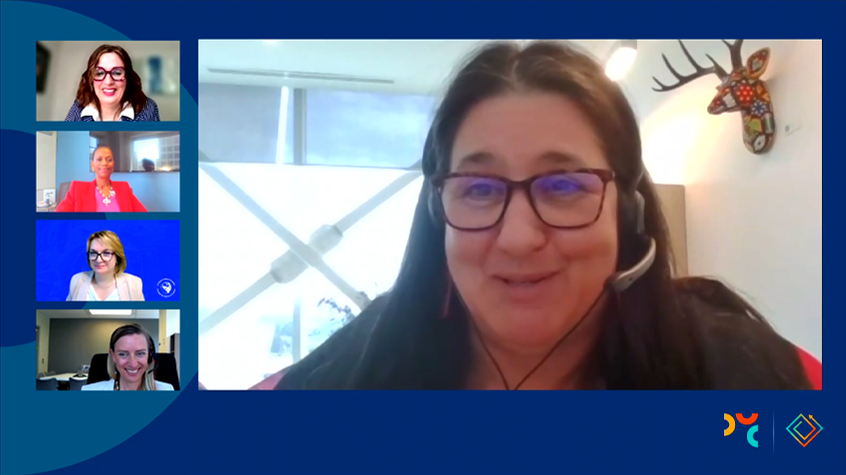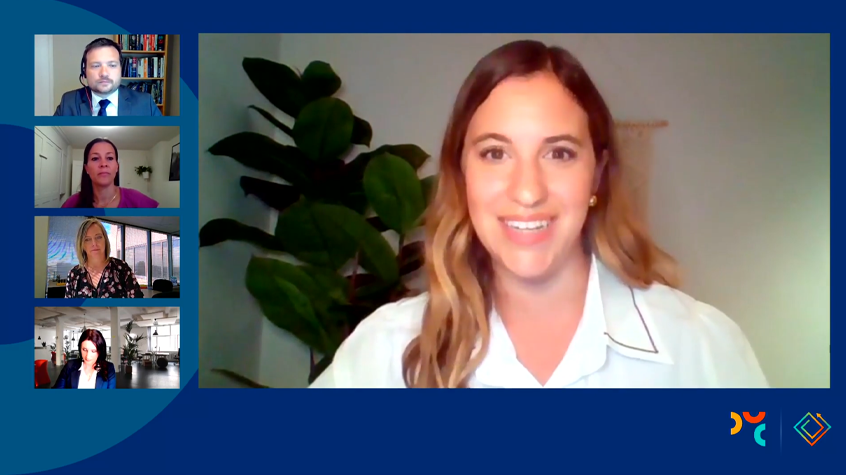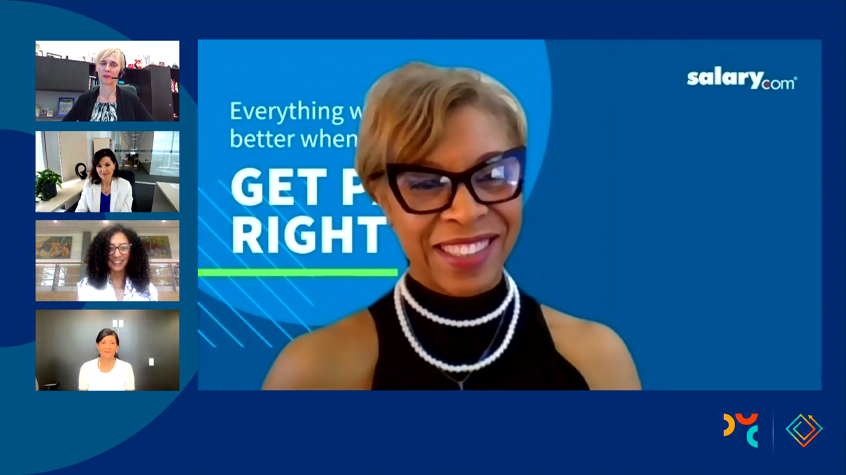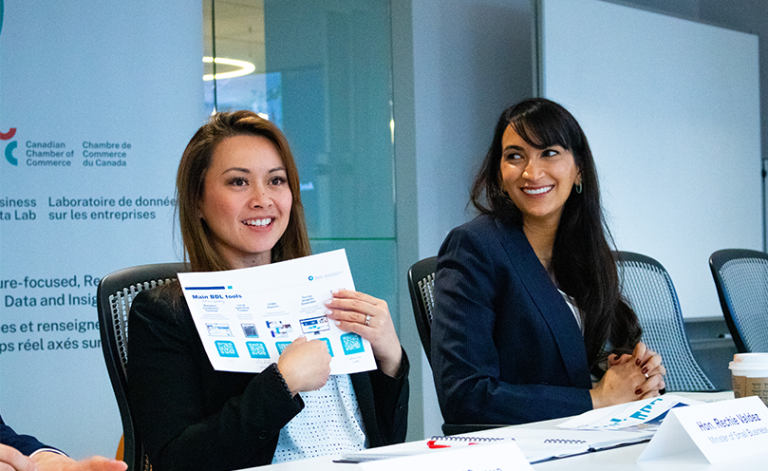Blog /
What We Heard: Women in Business Summit 2022
What We Heard: Women in Business Summit 2022
Wednesday June 22 marked our second annual Women in Business Summit, an event that aims to provide government and the...

Wednesday June 22 marked our second annual Women in Business Summit, an event that aims to provide government and the business community with policy recommendations and practical tools and strategies to address barriers facing women in the workforce and Canada’s economic growth.
This year’s theme was Restarting, Reimagining, Accelerating and Recuperating: Women in the Post-pandemic Era. The day’s agenda was chock full of insightful discussions, from a brilliant keynote address by CBC’s Dragons’ Den’s Manjit Minhas to panel discussions about entrepreneurship, inclusive workplaces, career transitions, health and more.
For those who missed the day’s event or want to go back and rewatch the sessions in full, you can do so here.
For a summary of the day’s biggest lessons and takeaways, read on!

Be bold and unapologetic
Our morning kicked off with an inspiring keynote from “beer baroness” Manjit Minhas, co-founder and co-owner of the Minhas Breweries & Distillery and star Dragon on CBC’s Dragons’ Den. Her candid story detailed how, at the age of 19, Minhas and her brother went into business with one year of an engineering degree under her belt, $10,000 in personal savings and an idea – make high quality spirits with real ingredients, and sell them at a fair, everyday low price.
There’s no elevator to success. You have to take the stairs.
Manjit Minhas, Co-Founder, Minhas Breweries & Distillery
Yet, as Minhas was quick to point out, there was no overnight success. Years of hard work and a series of bold moves including a fateful business partnership forged on a cocktail napkin, travelling thousands of kilometers for quarterly meetings that she materialized out of sheer perseverance and having the courage to take on industry giants were key factors. Today, Minhas Breweries & Distillery have 1,000 employees and sell their products in 16 countries.
Top Tips from Manjit Minhas
- Get comfortable taking risks.
- Choose the people around you carefully, surround yourself with truth-tellers.
- Ask for (and take!) help.
- Don’t fear being wrong, learn from it.
- Be unapologetic about who you are.
- You don’t get what you deserve, you get what you negotiate.
- Ensure you are lifting other women as you rise.
- Always have goals … but write them in pencil so you can change and adapt as needed.
Mentors and sponsors (and why you need both)
Mentorship played an important part of Minhas’ entrepreneurial journey, and its importance was a theme that cropped up numerous times across several panels.
Mentors are an important resource that can help women network and grow professionally. Both mentors and mentees can teach new skills, offer guidance and serve as important role models for each other. Equally important however are sponsors. These are the people who serve as champions and will bring up women’s names when promotions and staffing are being discussed.
Key Takeaways
- Mentors teach, but sponsors advocate – both are important.
- Mentors have just as much to learn from mentees.
- Mentors and sponsors are important to upskilling and leadership pipelines for women.
Top Tips
- Seek out a mentor in your organization who is on a completely different team – it’s a great way to get exposure to other types of work and gives you a fresh perspective on your own.
- When considering potential sponsors, remember that a sponsor doesn’t need to be a peak decision-maker but someone who will champion you in the room with them.
- For mentors: ask prospective mentees to come to you with three questions and one thing they can teach you.
- Consider offering “step-out projects” for employees to give them the opportunity to take on projects and deliver something of value, with the equally weighted goal of learning and getting exposure to different parts of the business.
Representation matters

When people see themselves represented in the media, boardrooms, workforces and success stories, it sends the message that those achievements are possible.
Jenn Harper, Founder of Cheekbone Beauty shared her own powerful experience of seeing the Cheekbone Beauty Sephora billboard in Toronto’s Eaton Center for the first time. As a child she never could have imagined seeing mainstream Indigenous representation like that nor the possibility of someone like her owning a business. Now, she knows that young Indigenous women will know that they too can build something, thanks to the work of incredible Indigenous business leaders across the country.
That girl will never have to question whether she can build something.
Jenn Harper, Founder, Cheekbone Beauty
Key Takeaways
- Representation in the workforce inspires more participation in the workforce.
- Including women and minority groups means more complete knowledge, ways of problem solving and better outcomes for employers and employees.
- DEI doesn’t start and end with HR. Biases play out in meeting rooms, in informal conversations, so we need to ensure best practices are being implemented there.
- What’s good for women is good for everyone; and what is good for everyone is good for women.
Top Tips
- Use data to look for bias and don’t just look for the data that makes you feel comfortable with the status quo – look for the data that makes you uncomfortable. These are the areas holding you back, especially when it comes to diversity and representation.
- Employers – try an “opt-out” mechanism vs. a self-nomination process when it comes to promotions and leadership pipelines. You’ll find many more women employees in the talent pool when they do not have to self-nominate.
- Consider a formal skills assessments for employees – it will help employers fill open positions internally with employees who are very well suited to the job despite not having an obvious set of matching hard skills.
- Include a third-party bias moderator in staffing discussions. They are trained to flag when bias may be affecting a decision.
- Make sure you have supports in place for people with disabilities – otherwise you’re missing out on an entire talent pool.
Flexibility

Flexibility is the name of the game when it comes to the future of the workforce. From finances to workplaces and employee well-being, it’s crucial that both employers and employees integrate flexibility into their mindset and systems.
Lynn Groulx, CEO of the Native Women’s Association of Canada, shared the journey of transitioning Indigenous community care and services offered by elders, something that would traditionally never be offered virtually, to an online platform during the pandemic. Despite some initial reluctance, they were able to provide crucial services to over 12,000 Indigenous women – thousands more than they would usually be able to help.
We had to adapt. We worked with our elders, youth and community to find solutions, and we did find some.
Lynn Groulx, CEO, Native Women’s Association of Canada
Key Takeaways

- Let’s not revert back to what was considered “normal” in the workplace.
- Productivity should trump presentee-ism. It’s not about how many hours someone is in the office, it’s about the work they are producing.
- Exploring and investing in digital operations and services can help businesses become more agile.
Top Tips
- Even if something seems like it will be impossible to do differently – try it anyways. The risk will often pay off.
- Ensure distance and location are not factors when making decisions about advancement for employees.
- Focus on employee outcomes over face-time.
People-first approach
One of the most common themes of the day’s panel discussions was the crucial need for employers to have a people-first approach to their business.
Empathy is what makes great leaders, strong CEOs and entrepreneurs. Asking questions like ‘What do you need?’ or ‘How can I help you?’ – those are the lessons we need to build back.
Maayan Ziv, Founder & CEO, AccessNow
Key Takeaways

- Lead with empathy and kindness.
- Flexible work policies are key to a people-first approach.
- “Authenticity” has to be more than lip service. We need to understand what barriers exist for employees to be their most authentic selves, and then work hard to remove them.
- A Care Economy Strategy is going to be crucial to keep women in the economy, and is something businesses and government need to work on together.
Top Tips
- Implement flexible workplace policies that reflect and respond to the reality of employee’s situations.
- Give people the paid time off and flexibility they need to access health care and resources – currently it requires a great deal of privilege to navigate access to healthcare.
- Data is critical. When you’re working with data, qualitative data is just as important as quantitative. Conduct interviews and talk to people – it will reliably give you a different perspective than a survey.
- Make sure workloads are manageable. Decide on what is “mission critical” vs. “nice to have”.
- Leaders need to lead by example – by role-modeling behaviour, you communicate to your employees that it truly is ok.
For entrepreneurs

We heard from many inspiring entrepreneurs. Some of their top tips for aspiring entrepreneurs include:
Top Tips
- Understand risk, but don’t shy away from it.
- Build a small and supportive team to start.
- Seek validation and ask questions of other entrepreneurs.
- Start by focusing on dominating your own backyard, then grow out from there.
- Know what you’re good at, and hire people for the things you are not good at. This will help you round out the skillset required for successfully growing your business.
- Don’t be overly committed to your financial plan. The pandemic demonstrated the need for a flexible approach to finances and business plans.
And one more for the road
Top Tip
- When it comes to big decisions, trust your gut and don’t forget to talk to the people who matter most to you. It’s easy to make assumptions about what your loved ones will think or worry about how your decision may impact them – talk to them and you may be surprised by their reaction.
Related News

What We Heard at The State of Small Businesses in Canada Virtual Event

Nice Guys Finish First: Empowering Canadian Business with Negotiation Strategies





